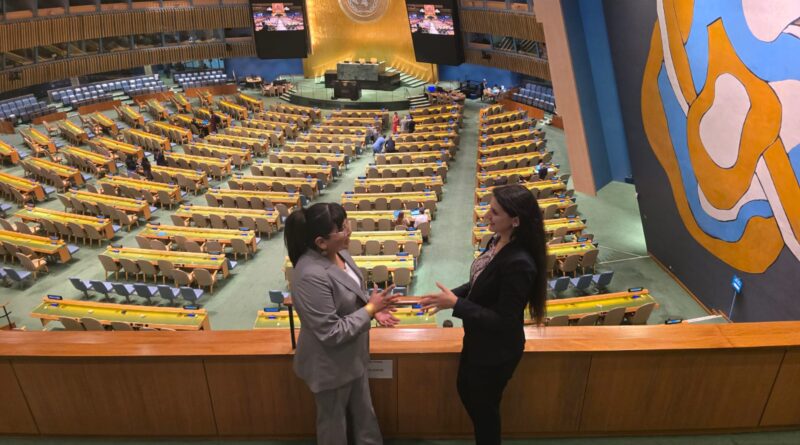“Sin agua no hay vida y sin acceso digno al agua no hay justicia feminista”
El pasado 9 y 10 de julio, Adriana Salazar, una mujer joven aymara de Bolivia, participó en representación del proyecto Women Power 2030 en la reunión preparatoria multisectorial y en la sesión de intercambio de ideas con Actores Claves, llevadas a cabo en la sede de Naciones Unidas en Nueva York.
Estos espacios reunieron a representantes de organizaciones de la sociedad civil, organismos internacionales, gobiernos y otros actores clave comprometidos con la justicia climática y de género. Las actividades fueron convocadas por las Naciones Unidas como antesala a la Cumbre Mundial del Agua 2026, que se llevará a cabo el próximo año en Emiratos Árabes. El objetivo de estos encuentros fue propiciar diálogos interactivos que fortalezcan el camino para cumplir el Objetivo de Desarrollo Sostenible N° 6: Agua Limpia y Saneamiento, garantizando un enfoque inclusivo y de derechos.
Durante la sesión, Adriana tuvo la oportunidad de presentar el “Posicionamiento político en defensa del agua desde las mujeres jóvenes en toda su diversidad del Proyecto Women Power 2030 en América Latina”, un pronunciamiento construido colectivamente por las jóvenes lideresas de los cinco países de la región que participan en el proyecto.
El documento denuncia las desigualdades estructurales en el acceso al agua que enfrentan mujeres, niñas, comunidades indígenas, rurales y afrodescendientes en América Latina y el Sur Global. Señala cómo la crisis hídrica, el extractivismo y la falta de políticas públicas con enfoque de derechos y perspectiva de género profundizan la vulnerabilidad de quienes han sido históricamente excluidas.
Asimismo, el posicionamiento exige que el acceso al agua sea reconocido y garantizado como un derecho humano fundamental, con justicia climática, género e interseccionalidad como ejes centrales. También reclama participación efectiva de mujeres y juventudes en las políticas hídricas, entre otros puntos.
“Porque sin agua no hay vida, y sin acceso digno al agua no hay justicia feminista. El agua no se negocia, se defiende”, expresó la joven al cierre de su discurso.
La participación de Adriana en este encuentro permitió visibilizar las demandas y propuestas de las mujeres jóvenes de América Latina.
————————————————————————————-
“Without water there is no life and without dignified access to water there is no feminist justice”
On July 9 and 10, Adriana Salazar, a young Bolivian activist, participated in representation of the Women Power 2030 project in the multisectoral preparatory meeting and in the session of exchange of ideas with Key Actors, carried out at the United Nations headquarters in New York.
These spaces brought together representatives of civil society organizations, international organizations, governments and other key actors committed to climate and gender justice. The activities were convened by the United Nations as a prelude to the World Water Summit 2026, which will be held next year in the United Arab Emirates. The objective of these meetings was to promote interactive dialogues that strengthen the path to meet Sustainable Development Goal
No. 6: Clean Water and Sanitation, guaranteeing an approach of inclusivity and human rights.
During the session, Adriana had the opportunity to present the «Political positioning in
defense of water from young women in all its diversity of the Women Power 2030 Project in Latin America», a statement collectively built by the young leaders of the five countries of the region that participate in the project.
The document denounces the structural inequalities in access to water faced by women, girls, indigenous, rural and Afro-descendant communities in Latin America and the Global South. It points out how the water crisis, extractivism and the lack of public policies with a focus on rights and a gender perspective deepen the vulnerability of those who have been historically excluded.
Likewise, the positioning requires that access to water be recognized and guaranteed as a fundamental human right, with climate justice, gender and intersectionality as central axes. It also calls for the effective participation of women and young people in water policies, among other points.
«Because without water there is no life, and without dignified access to water there is no feminist justice. Water is not negotiated, it is defended»; said the young woman at the end of her speech.
Adriana's participation in this meeting made it possible to make visible the demands and proposals of young women in Latin America.


